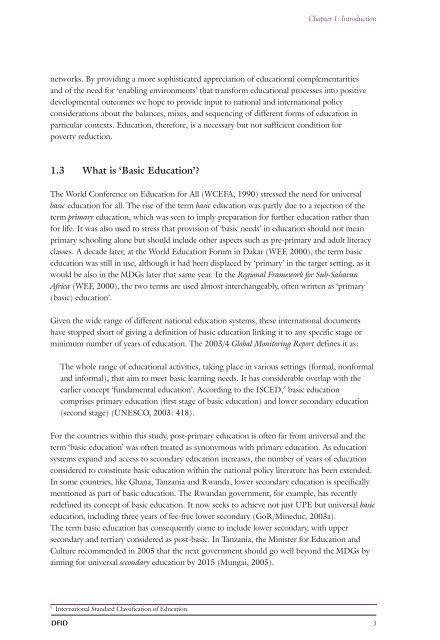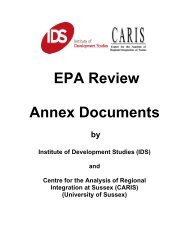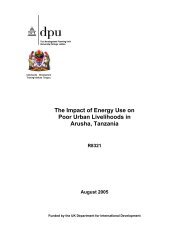Educating out of Poverty? A Synthesis Report on Ghana, India ... - DfID
Educating out of Poverty? A Synthesis Report on Ghana, India ... - DfID
Educating out of Poverty? A Synthesis Report on Ghana, India ... - DfID
Create successful ePaper yourself
Turn your PDF publications into a flip-book with our unique Google optimized e-Paper software.
networks. By providing a more sophisticated appreciati<strong>on</strong> <str<strong>on</strong>g>of</str<strong>on</strong>g> educati<strong>on</strong>al complementarities<br />
and <str<strong>on</strong>g>of</str<strong>on</strong>g> the need for ‘enabling envir<strong>on</strong>ments’ that transform educati<strong>on</strong>al processes into positive<br />
developmental <str<strong>on</strong>g>out</str<strong>on</strong>g>comes we hope to provide input to nati<strong>on</strong>al and internati<strong>on</strong>al policy<br />
c<strong>on</strong>siderati<strong>on</strong>s ab<str<strong>on</strong>g>out</str<strong>on</strong>g> the balances, mixes, and sequencing <str<strong>on</strong>g>of</str<strong>on</strong>g> different forms <str<strong>on</strong>g>of</str<strong>on</strong>g> educati<strong>on</strong> in<br />
particular c<strong>on</strong>texts. Educati<strong>on</strong>, therefore, is a necessary but not sufficient c<strong>on</strong>diti<strong>on</strong> for<br />
poverty reducti<strong>on</strong>.<br />
1.3 What is ‘Basic Educati<strong>on</strong>’?<br />
Chapter 1: Introducti<strong>on</strong><br />
The World C<strong>on</strong>ference <strong>on</strong> Educati<strong>on</strong> for All (WCEFA, 1990) stressed the need for universal<br />
basic educati<strong>on</strong> for all. The rise <str<strong>on</strong>g>of</str<strong>on</strong>g> the term basic educati<strong>on</strong> was partly due to a rejecti<strong>on</strong> <str<strong>on</strong>g>of</str<strong>on</strong>g> the<br />
term primary educati<strong>on</strong>, which was seen to imply preparati<strong>on</strong> for further educati<strong>on</strong> rather than<br />
for life. It was also used to stress that provisi<strong>on</strong> <str<strong>on</strong>g>of</str<strong>on</strong>g> ‘basic needs’ in educati<strong>on</strong> should not mean<br />
primary schooling al<strong>on</strong>e but should include other aspects such as pre-primary and adult literacy<br />
classes. A decade later, at the World Educati<strong>on</strong> Forum in Dakar (WEF, 2000), the term basic<br />
educati<strong>on</strong> was still in use, although it had been displaced by ‘primary’ in the target setting, as it<br />
would be also in the MDGs later that same year. In the Regi<strong>on</strong>al Framework for Sub-Saharan<br />
Africa (WEF, 2000), the two terms are used almost interchangeably, <str<strong>on</strong>g>of</str<strong>on</strong>g>ten written as ‘primary<br />
(basic) educati<strong>on</strong>’.<br />
Given the wide range <str<strong>on</strong>g>of</str<strong>on</strong>g> different nati<strong>on</strong>al educati<strong>on</strong> systems, these internati<strong>on</strong>al documents<br />
have stopped short <str<strong>on</strong>g>of</str<strong>on</strong>g> giving a definiti<strong>on</strong> <str<strong>on</strong>g>of</str<strong>on</strong>g> basic educati<strong>on</strong> linking it to any specific stage or<br />
minimum number <str<strong>on</strong>g>of</str<strong>on</strong>g> years <str<strong>on</strong>g>of</str<strong>on</strong>g> educati<strong>on</strong>. The 2003/4 Global M<strong>on</strong>itoring <str<strong>on</strong>g>Report</str<strong>on</strong>g> defines it as:<br />
The whole range <str<strong>on</strong>g>of</str<strong>on</strong>g> educati<strong>on</strong>al activities, taking place in various settings (formal, n<strong>on</strong>formal<br />
and informal), that aim to meet basic learning needs. It has c<strong>on</strong>siderable overlap with the<br />
earlier c<strong>on</strong>cept ‘fundamental educati<strong>on</strong>’. According to the ISCED, 5 basic educati<strong>on</strong><br />
comprises primary educati<strong>on</strong> (first stage <str<strong>on</strong>g>of</str<strong>on</strong>g> basic educati<strong>on</strong>) and lower sec<strong>on</strong>dary educati<strong>on</strong><br />
(sec<strong>on</strong>d stage) (UNESCO, 2003: 418).<br />
For the countries within this study, post-primary educati<strong>on</strong> is <str<strong>on</strong>g>of</str<strong>on</strong>g>ten far from universal and the<br />
term ‘basic educati<strong>on</strong>’ was <str<strong>on</strong>g>of</str<strong>on</strong>g>ten treated as syn<strong>on</strong>ymous with primary educati<strong>on</strong>. As educati<strong>on</strong><br />
systems expand and access to sec<strong>on</strong>dary educati<strong>on</strong> increases, the number <str<strong>on</strong>g>of</str<strong>on</strong>g> years <str<strong>on</strong>g>of</str<strong>on</strong>g> educati<strong>on</strong><br />
c<strong>on</strong>sidered to c<strong>on</strong>stitute basic educati<strong>on</strong> within the nati<strong>on</strong>al policy literature has been extended.<br />
In some countries, like <strong>Ghana</strong>, Tanzania and Rwanda, lower sec<strong>on</strong>dary educati<strong>on</strong> is specifically<br />
menti<strong>on</strong>ed as part <str<strong>on</strong>g>of</str<strong>on</strong>g> basic educati<strong>on</strong>. The Rwandan government, for example, has recently<br />
redefined its c<strong>on</strong>cept <str<strong>on</strong>g>of</str<strong>on</strong>g> basic educati<strong>on</strong>. It now seeks to achieve not just UPE but universal basic<br />
educati<strong>on</strong>, including three years <str<strong>on</strong>g>of</str<strong>on</strong>g> fee-free lower sec<strong>on</strong>dary (GoR/Mineduc, 2003a).<br />
The term basic educati<strong>on</strong> has c<strong>on</strong>sequently come to include lower sec<strong>on</strong>dary, with upper<br />
sec<strong>on</strong>dary and tertiary c<strong>on</strong>sidered as post-basic. In Tanzania, the Minister for Educati<strong>on</strong> and<br />
Culture recommended in 2005 that the next government should go well bey<strong>on</strong>d the MDGs by<br />
aiming for universal sec<strong>on</strong>dary educati<strong>on</strong> by 2015 (Mungai, 2005).<br />
5 Internati<strong>on</strong>al Standard Classificati<strong>on</strong> <str<strong>on</strong>g>of</str<strong>on</strong>g> Educati<strong>on</strong>.<br />
DFID 3

















